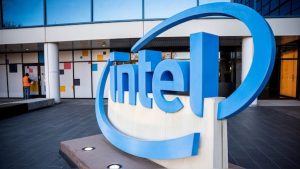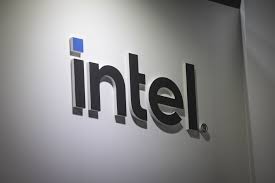Intel Corporation experienced a significant surge in its stock price on Tuesday, February 18, gaining more than 10% following reports that two major industry rivals, Taiwan Semiconductor Manufacturing Co. (TSMC) and Broadcom, are exploring potential deals that could lead to a major restructuring of the company. The speculation stems from reports over the weekend suggesting that Intel, a longtime leader in the semiconductor industry, could be broken into separate entities as part of a strategic shake-up.
According to Bloomberg News, TSMC has reportedly discussed the possibility of taking over the operation of Intel’s U.S.-based manufacturing facilities. The proposal also includes the potential for TSMC to acquire a controlling stake in a newly formed venture, giving the Taiwanese chipmaking giant substantial influence over Intel’s production infrastructure. If such a deal materializes, it could mark a significant shift in Intel’s manufacturing strategy, as the company has traditionally maintained tight control over its own fabrication facilities.

Meanwhile, a separate report from The Wall Street Journal suggests that Broadcom has engaged in informal discussions with advisers about the possibility of acquiring Intel’s chip design and marketing divisions. This move would effectively separate Intel’s manufacturing arm from its product development and sales operations, a long-speculated scenario among industry analysts and investors.
The possibility of an Intel breakup has been a recurring topic of debate within the semiconductor industry for some time. Many analysts have argued that splitting the company’s manufacturing and product development divisions could create more focused, efficient business units, while others believe that Intel’s integrated model remains key to its competitive advantage. The latest reports have reignited discussions about Intel’s future, with investors closely watching for any official announcements regarding the company’s strategic direction.
In response to the speculation, Intel has acknowledged that the question of whether to separate its factory operations from its product development arm remains open. However, the company has not provided any concrete details about potential restructuring plans. As the semiconductor industry continues to evolve with increasing competition and demand for advanced chip technology, Intel’s next moves could have significant implications for both the company and the broader market.
Intel Shares See Biggest Single-Day Surge Since October 2023 Amid Breakup Speculation and Altera Stake Sale Talks
Intel Corporation’s stock experienced a sharp rally on Tuesday, climbing as high as $26.24 during trading in New York. This marked the company’s most significant single-day gain since multiple trading sessions on October 27, 2023. The surge was fueled by ongoing market speculation regarding potential restructuring deals, including reported discussions involving Taiwan Semiconductor Manufacturing Co. (TSMC) and Broadcom.
Through the end of last week, Intel’s stock had already risen by 18% year-to-date (YTD), with investors closely monitoring developments related to a possible corporate split. Reports of potential deals that could separate Intel’s manufacturing operations from its chip design and marketing divisions have reignited investor interest and driven up the company’s valuation in recent trading sessions.
Adding to the momentum, Bloomberg News reported on Tuesday that Silver Lake Management, a prominent private equity firm specializing in technology investments, is in exclusive negotiations to acquire a majority stake in Altera, Intel’s programmable chip unit. Altera, which Intel acquired in 2015 for approximately $16.7 billion, plays a key role in the company’s portfolio by providing field-programmable gate arrays (FPGAs) used in data centers, telecommunications, and AI applications.
According to sources familiar with the matter, the discussions between Intel and Silver Lake have reached an advanced stage, although the exact terms and size of the potential stake sale remain undetermined. If finalized, the deal could provide Intel with additional capital while allowing Silver Lake to take a leading role in shaping Altera’s future direction.
These latest developments highlight the ongoing strategic shifts within Intel as it navigates an increasingly competitive semiconductor landscape. While the company has not officially confirmed any impending restructuring decisions, the heightened speculation and reported deal discussions have led to increased market activity surrounding Intel’s stock.
Intel’s Struggles and Leadership Shake-Up Amid Market Share Decline and Potential Deal Talks
Intel, once the undisputed leader in the semiconductor industry, has faced significant challenges in recent years as it struggles to reclaim its technological dominance. The company has lost market share to competitors, particularly in the rapidly evolving artificial intelligence (AI) sector, where it failed to capitalize on the shift toward AI accelerators. This oversight allowed Nvidia to establish a commanding lead in AI-driven chip technology, further intensifying competition in the industry.
In response to these struggles, Intel’s board of directors took decisive action by removing CEO Pat Gelsinger after his comeback strategy failed to deliver results at the expected pace. Under Gelsinger’s leadership, Intel aimed to regain its competitive edge through a series of strategic initiatives, including investments in chip manufacturing and technological advancements. However, the slow progress of these efforts led to growing concerns among investors and board members, prompting the search for a new CEO who could steer the company in a more effective direction.
Meanwhile, discussions about potential restructuring and acquisition deals involving Intel have continued to circulate. Bloomberg reported last year that Broadcom had evaluated the possibility of pursuing a deal with Intel but ultimately chose not to move forward at the time. Despite this, financial advisers have continued to present strategic proposals to Broadcom, keeping the idea of a potential transaction in play.
One key development that could facilitate such a deal is the proposed factory partnership between Intel and Taiwan Semiconductor Manufacturing Co. (TSMC). Reports suggest that TSMC is considering taking operational control of Intel’s U.S. manufacturing facilities and acquiring a controlling stake in the venture. If this plan materializes, it could create a clearer path for Broadcom to negotiate the acquisition of Intel’s product development unit. However, at this stage, neither the TSMC factory proposal nor a Broadcom acquisition has progressed beyond preliminary discussions.
As Intel navigates these complex challenges, the company remains at a crossroads, balancing efforts to reclaim its market position with the possibility of a significant structural transformation. While speculation about a corporate split or major deal persists, Intel has not confirmed any final decisions, leaving the industry watching closely for further developments.
White House Reportedly Skeptical of Foreign Control Over Intel’s Factories Despite TSMC Deal Discussions
According to recent reports, officials from the Trump administration have discussed the possibility of a deal involving Taiwan Semiconductor Manufacturing Co. (TSMC) operating Intel’s factories in the United States during recent meetings. The proposal, which has been a topic of speculation, suggests that TSMC could take control of Intel’s domestic manufacturing facilities as part of a broader restructuring effort.
However, despite these discussions, a White House official reportedly indicated last week that then-U.S. President Donald Trump would be unlikely to support such an arrangement. The administration’s reluctance stems from concerns about allowing a foreign entity to oversee critical semiconductor production within the United States, particularly at a time when the country has been focused on strengthening domestic chip manufacturing capabilities and reducing reliance on overseas supply chains.
The potential involvement of TSMC in Intel’s operations raises broader questions about national security, technological sovereignty, and economic strategy. While the idea of leveraging TSMC’s expertise in chip manufacturing could offer benefits, opposition from the White House suggests that any move in this direction would likely face significant political and regulatory scrutiny.
As discussions around Intel’s future continue, the role of government policy and national security considerations is expected to play a crucial part in shaping any potential deal. However, as of now, no formal agreement has been reached, and the prospects of a foreign-operated Intel manufacturing unit remain uncertain.
Intel Benefits from U.S. Onshoring Efforts but Faces Market Challenges
Intel has been one of the primary beneficiaries of the U.S. government’s push to strengthen domestic semiconductor manufacturing, an initiative spearheaded by President Joe Biden’s administration. In an effort to reduce dependence on foreign chip production and bolster national security, the U.S. has prioritized investment in homegrown semiconductor capabilities, with Intel playing a key role in this strategy.
As part of these efforts, the U.S. Commerce Department announced in November that it was finalizing a substantial government subsidy package for Intel, totaling $7.86 billion. This funding is intended to support Intel’s expansion and modernization of its manufacturing facilities, reinforcing its position as one of the few semiconductor companies that both design and produce their own chips. Unlike many other players in the industry that rely on third-party manufacturers, Intel’s integrated model allows it to maintain greater control over the entire chip production process.
Despite these advantages and government backing, Intel has faced significant financial and competitive challenges. In the past year, the company’s stock experienced a sharp decline, losing approximately 60% of its value. This downturn reflects broader struggles, including delays in technology development, increased competition from rivals such as Nvidia and AMD, and shifting industry dynamics.
While Intel continues to receive strong support from U.S. policymakers aiming to revitalize the domestic semiconductor industry, the company remains under pressure to execute its turnaround strategy effectively and regain its competitive edge in an increasingly challenging market.

